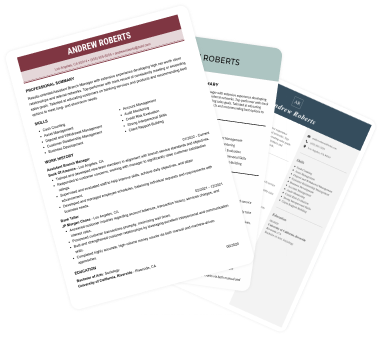Create a professional CV now!
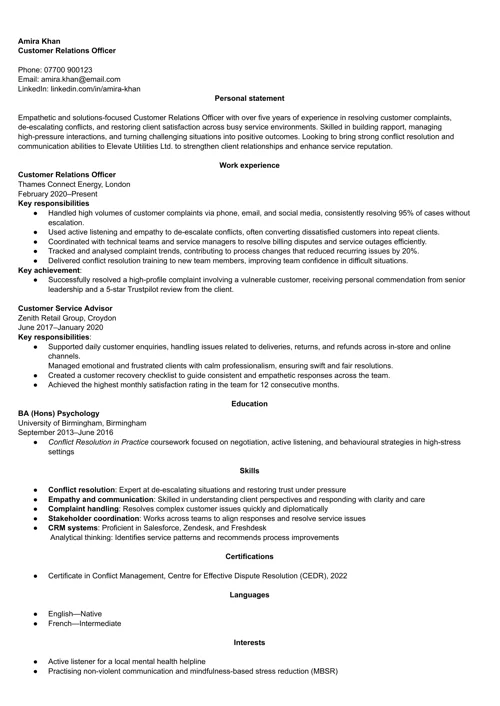 NO
NO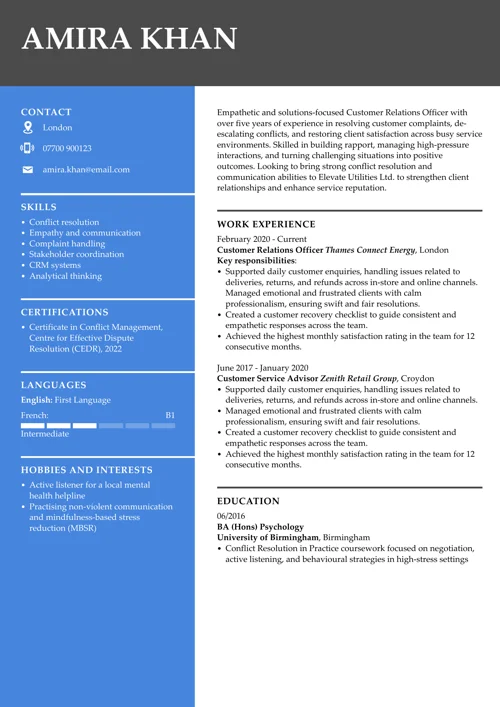 YES
YESLast updated on 29 December, 2025
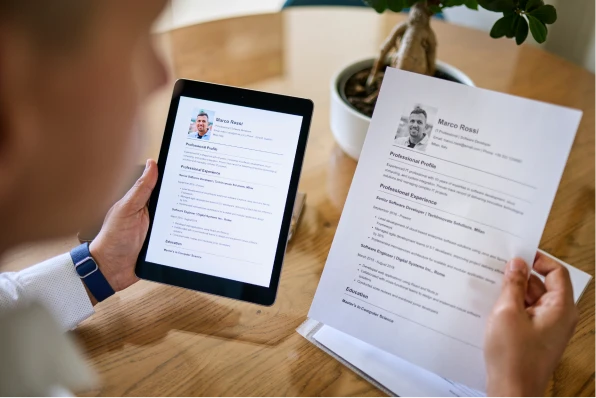
Our customers have been hired by*:
Conflicts at work are inevitable—people have different perspectives, stress levels can run high, and sometimes, things just get misunderstood. But those conflicts don’t have to ruin a project or damage team relationships.
Knowing how to handle tricky situations calmly and fairly is a skill every employer values. Conflict management is about listening well, staying clear-headed, and finding common ground. In this article, we’ll look at what conflict resolution skills are, why they matter, and how you can show them off in your CV.
Create an effective CV in minutes. Choose a professional CV template and fill in every section of your CV in a flash using ready-made content and expert tips.
Create a professional CV now!
 NO
NO YES
YESWe created the sample on the left using our builder. See other good CV examples like this one.
Looking for other skills guides? Check these out:
Conflict resolution skills are the ability to manage and resolve disagreements in a calm, constructive way. These skills matter in a workplace as different views, personalities, and goals can easily lead to tension. Effective conflict resolution helps maintain a positive work environment, strengthens relationships, and keeps teams focused on shared goals.
Conflict resolution skills come with active listening, empathy, clear communication, problem-solving, and the ability to stay calm under pressure. In a work environment, these skills allow employees to handle disputes professionally, find common ground, and prevent issues from escalating. Whether you're working in a team, leading others, or dealing with clients, strong conflict resolution skills strengthen collaboration and help achieve long-term success.
Conflicts can happen in many situations at work, and understanding the type of conflict you're facing can help you handle it more effectively. When you can identify the source of the issue, it's easier to choose the right way to resolve it—whether it's a disagreement within the team or a leadership issue.
Here are some of the most common types of workplace conflict:
It’s natural for people to experience conflicts from time to time—we all have different backgrounds, experiences, perspectives, and communication styles. In the workplace, these differences can be further intensified by varying work styles and priorities, which can lead to tension. Misunderstandings, personality clashes, or disagreements over how to approach a task are all natural and expected. Since co-workers often operate at the same level, resolving these conflicts requires good teamwork, compromise, and open communication to stay focused on shared objectives.
Sometimes, disputes arise between team members and their supervisors over task expectations, workload, feedback, or management style. Employees may sometimes feel micromanaged or unsupported, while managers might struggle to keep the team focused on the company’s goals. Given the hierarchy in these situations, they require strong communication, mutual respect, and clear boundaries to resolve.
Cross-team collaboration is essential in many workplaces, but it can also create tension. Conflicts may flare up due to inconsistent goals, unclear responsibilities, or competition for resources. For example, a marketing team and a sales team may clash over messaging or priorities. These types of conflicts are best addressed through stronger communication and a more collaborative approach between different departments.
Staff who regularly engage with clients often have to resolve issues related to dissatisfaction or unfulfilled expectations. These conflicts require sensitivity, patience, and excellent problem-solving skills. The goal is to maintain positive client relationships while representing the company’s policies and standards fairly.
Sometimes, conflict arises not from individuals but from broader organisational issues, like unclear roles, poor communication systems, or inconsistent leadership. These systemic issues can cause frustration, low morale, and recurring disputes. Addressing this type of conflict usually involves improving workflows, revisiting team structures, or investing in leadership development.
Below are key conflict management skills that prove valuable across different roles and work environments:
Active listening means giving your full attention, avoiding interruptions, and genuinely trying to understand the speaker, both their words and intent. It helps reduce misunderstandings, shows respect, and lays the groundwork for more productive conversations. It’s especially useful when tensions are high, as it helps both sides feel heard and valued.
Empathy is the ability to put yourself in someone else’s shoes and understand how they feel. In conflict situations, showing empathy can decrease tension and create a more open exchange of thoughts. It allows you to recognise others’ experiences and emotions, which helps build trust, repair relationships, and move toward a resolution that works for everyone.
Being able to express yourself clearly and calmly is essential in resolving conflict.Good communication helps you convey your thoughts without triggering feelings of defensiveness and ensures that everyone is on the same page. Whether you’re explaining your perspective or setting expectations, clarity prevents further confusion and keeps the focus on solutions.
Conflicts can spark strong emotions, but managing your reactions is key to keeping the conversation constructive. Emotional regulation means staying calm under pressure, handling frustration without lashing out, and knowing when to pause before responding. This helps prevent escalation and allows for more rational, respectful exchanges.
Conflict resolution isn’t just about smoothing things over—it’s about finding practical solutions. Problem-solving skills help you understand what’s causing the issue, generate ideas, and evaluate the best course of action. It’s a forward-looking skill that helps everyone move past the disagreement and focus on results.
A strong CV summary will convince the recruiter you’re the perfect candidate. Save time and choose a ready-made personal statement written by career experts and adjust it to your needs in the LiveCareer CV builder.
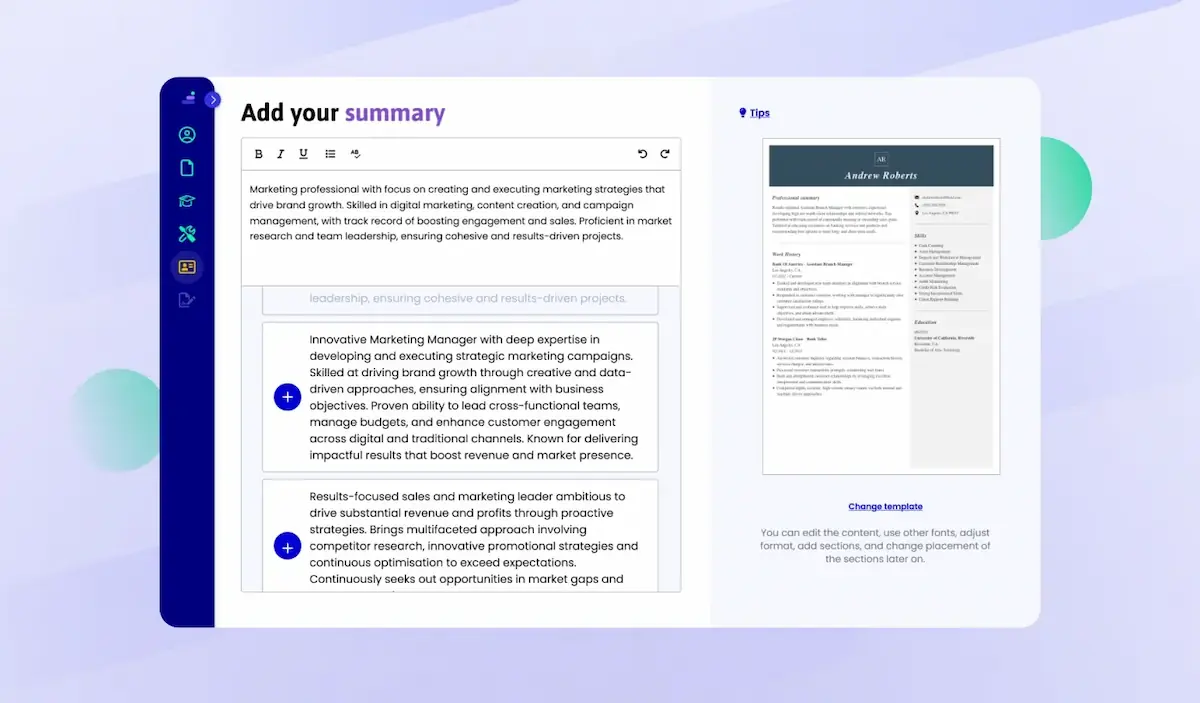
Sometimes, you’ll be the one others look to when tensions rise. Mediation means staying neutral, guiding a fair conversation, and helping people find common ground, without pushing your own viewpoint. When you handle it well, you can defuse conflict, rebuild trust, and keep the team working together.
Not all conflicts have a clear “win-win,” which is where negotiation comes in. It’s the ability to find balanced compromises by understanding each party’s needs, identifying shared goals, and working toward an outcome that everyone can accept. Skilled negotiators preserve relationships while still achieving results.
Assertiveness means communicating your needs, opinions, and boundaries clearly—without being aggressive or dismissive. When managing a conflict, it allows you to stand your ground while still acting respectful. This balance helps prevent resentment and encourages honest, direct conversations that lead to better outcomes.
Resolving conflict can take time, especially when emotions run high or multiple people are involved. Patience helps you remain calm, give others space to express themselves, and avoid rushing the process. It’s a key skill for creating lasting resolutions rather than quick fixes.
Being objective means keeping a clear head during conflict and focusing on facts, not assumptions or personal biases. It helps you step back, see the bigger picture, and consider different sides without getting drawn into drama. In the workplace, it’s a key skill for finding fair, practical solutions.
Disagreements happen in every workplace—however, good conflict resolution skills can help turn tension into teamwork. It’s not about being right, but finding common ground and moving forward. Here are five practical steps to help you handle conflict in a friendly way:
Before jumping to conclusions, take the time to truly understand the deepest issue. It could be miscommunication, differences in work styles, or clashing expectations. Identifying the root cause helps you address the real problem rather than just its symptoms, leading to a more effective resolution.
When tensions run high, it’s easy to let emotions take over—but staying calm is crucial. Keeping your cool helps you navigate the conversation more effectively and sets the tone for a more respectful, constructive exchange. Often, your calm presence can encourage others to do the same.
Ensure everyone involved has the opportunity to voice their concerns and feelings. Active listening is essential in conflict resolution, as it demonstrates that you value others’ perspectives. It can also uncover critical details that may help shift how you approach the issue and lead to a better understanding.
Express your thoughts clearly and thoughtfully. Avoid blaming or accusing language; instead, focus on “I” statements to communicate how the situation is affecting you. Clear communication helps prevent misunderstandings, reduces defensiveness, and keeps the conversation on track.
After everyone has shared their views, collaborate to find a solution that works for all parties involved. This could involve compromising or adjusting expectations. By working together to develop a mutually acceptable resolution, you help ensure that everyone feels heard and respected, and the conflict is resolved more sustainably.
Conflict management is a valuable skill in any workplace, showing employers that you can handle challenging situations with professionalism and restraint. Highlighting this ability on your CV presents you as someone who contributes to a positive and productive work environment. Here's how to effectively showcase your conflict management skills and demonstrate their impact.
Rather than saving it for later, highlight how you’ve handled challenging situations in your professional summary or throughout your work experience. Here’s how to effectively showcase conflict resolution skills in a personal profile:
Conflict resolution skills examples in the CV summary
Empathetic and solutions-focused Customer Relations Officer with over five years of experience in resolving customer complaints, de-escalating conflicts, and restoring client satisfaction across busy service environments. Skilled in building rapport, managing high-pressure interactions, and turning challenging situations into positive outcomes. Looking to bring strong conflict resolution and communication abilities to Elevate Utilities Ltd. to strengthen client relationships and enhance service reputation.
The work experience section is the best place to prove you’re not just good at avoiding conflict—you know how to step in, keep things cool, and turn tricky situations into productive outcomes. Here’s how to make it count:
Job description with conflict resolution skills
Customer Relations Officer
Thames Connect Energy, London
February 2020–Present
Key responsibilities
Key achievement:
You don’t have to be a CV writing expert. In the LiveCareer CV builder you’ll find ready-made content for every industry and position, which you can then add with a single click.

If you're early in your career, you can still show strong conflict resolution skills—even without extensive work experience. Focus your education section on moments where you helped manage disagreements, encouraged collaboration, or handled sensitive situations constructively.
You might highlight group projects where you eased tensions and kept the team focused, leadership roles where you mediated between different points of view, or even coursework in communication, psychology, or negotiation. These experiences show you can stay calm under pressure, listen actively, and guide people toward solutions—all valuable skills in any workplace.
Examples of conflict resolution skills in the education section
BA (Hons) Psychology
University of Birmingham, Birmingham
September 2013–June 2016
Your CV’s skills section is the perfect place to showcase the conflict resolution abilities that set you apart. Instead of listing generic qualities, focus on skills that reflect your ability to manage tension, handle difficult interactions, and maintain positive working relationships.
Here’s how to make this section more targeted and effective:
Conflict resolution skills examples in the skills section
Additional sections can strengthen your CV by showing that your conflict resolution skills extend beyond your core role. These elements offer valuable insight into how you communicate, collaborate, and manage difficult situations in different contexts.
Here are some sections worth including:
Examples of conflict management skills in the extra sections
Certifications
Languages
Interests
Use specific examples from your past roles to show how you’ve handled difficult situations, resolved disagreements, or maintained professionalism under pressure. Whether you dealt with client complaints, mediated between colleagues, or de-escalated tense conversations, these real-world examples give your CV weight and credibility.
A well-crafted cover letter is another opportunity to highlight these skills. Use it to explain how you approach conflict with calm, clarity, and fairness, and how that approach has made a difference in your previous roles. Despite the rise of quick digital applications, many employers still value a tailored cover letter as a sign of strong communication and emotional intelligence.
When your CV lands you an interview, it's time to demonstrate how your conflict resolution skills have made a positive impact in the workplace. Be prepared to share examples where you've successfully overcome disagreements, facilitated constructive discussions, or helped mediate between conflicting parties to reach a solution.
Use the STAR method (Situation, Task, Action, Result) to structure your answers with clarity. Describe a specific situation where conflict arose, outline your role in managing it, and explain the actions you took to address the issue—whether it was through communication, collaboration, or negotiation. Highlight the outcome, such as improved team dynamics, successful project completion, or enhanced motivation. If possible, provide examples of any positive feedback or recognition you received for your approach to conflict resolution.
A cover letter alone simply won’t be enough—you need an impactful CV, too. Create your CV in minutes. Just follow our wizard and fill in every CV section with ready-made content. Get started by choosing a professional CV template.
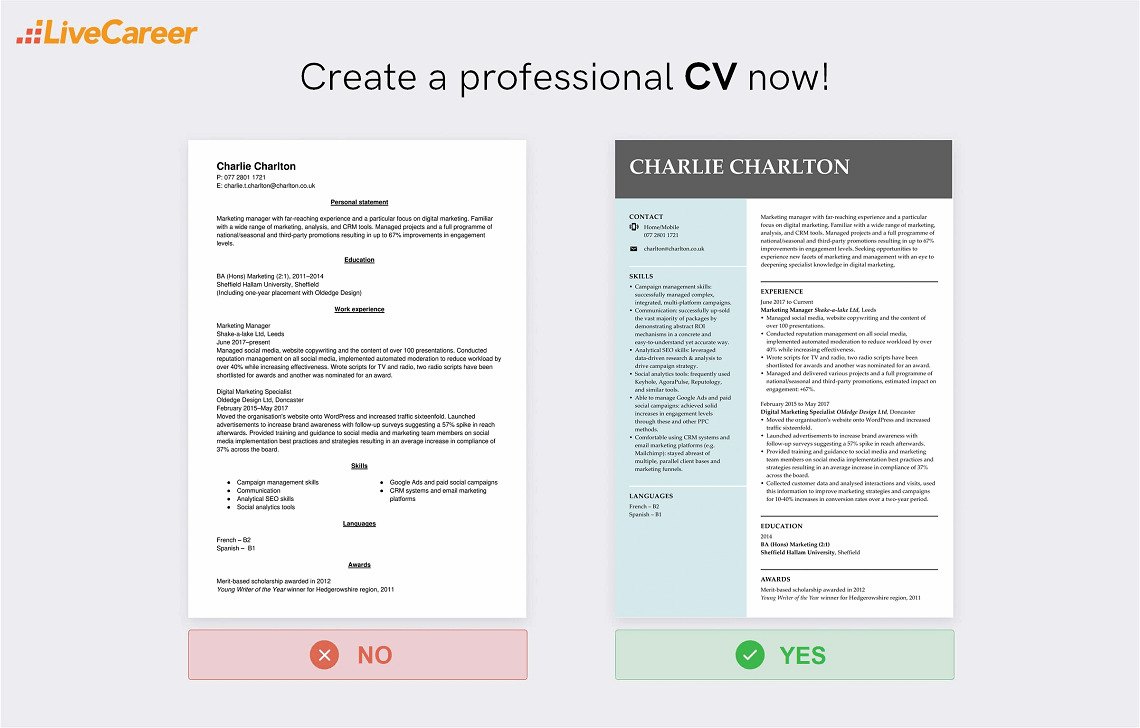
Thanks for reading! If you're unsure how to effectively showcase your conflict resolution skills on your CV—or need help tailoring them to a specific role—feel free to get in touch in the comments. We're here to help you present your strengths with clarity and confidence.
Our editorial team has reviewed this article for compliance with Livecareer’s editorial guidelines. It’s to ensure that our expert advice and recommendations are consistent across all our career guides and align with current CV and cover letter writing standards and trends. We’re trusted by over 10 million job seekers, supporting them on their way to finding their dream job. Each article is preceded by research and scrutiny to ensure our content responds to current market trends and demand.
Category: CV Help
Crafting a job-winning CV is all about showcasing your unique skills and experiences. Start with a strong personal statement that highlights your career goals and achievements.
Try Our CV Builder Now